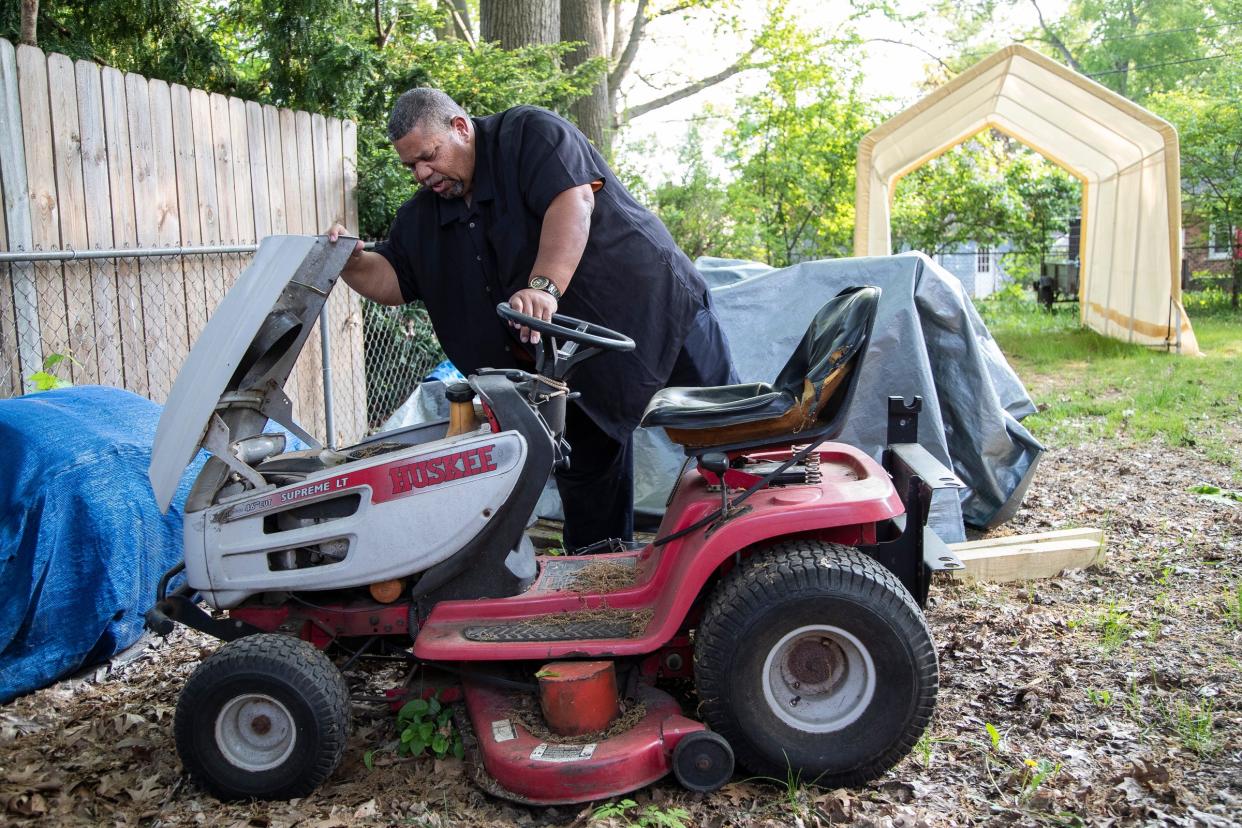Forced to retire at 60, this firefighter's finances took a big hit — like so many others
Martin Rucker had one joyful moment in the spotlight back in 2013, just as the city of Detroit wrangled through its painful municipal bankruptcy, the largest in U.S. history.
The fire engine operator with the magnificent, booming baritone won a "Home of the Brave National Anthem Singing Contest" at Comerica Park, home of the Tigers baseball team. The $10,000 prize was used for a number of things to help fellow firefighters, contributing to a department school supply drive, and to other projects, including paying for a microwave, at other firehouses in the city.
"That money kind of went everywhere," Rucker said.
His fellow firefighters fondly remember Rucker as the "fireman crooner." He has sung the national anthem at major Detroit stadiums and venues for many years.

Rucker worked in the Detroit Fire Department for 23 years and would have worked longer to get a full pension. But he had to retire in September 2022 at the mandatory age of 60. He, like others still on the job in 2013, felt the hit of the city's bankruptcy.
Many are now new retirees facing financial challenges.
Rucker's pension payout was a mix of old and new – calculated based on benefits accrued under the legacy plan, which was in place before the bankruptcy, and the hybrid plan, which took over after the bankruptcy and pays less to those who retired later.
Under the legacy plan, Rucker's pension benefit was frozen and the calculation was based on a 10% pay cut that hit many in the police and fire department in September 2013, a pay cut that was put in place to address the city's financial distress. Rucker's benefits under the legacy plan did not accrue any cost of living adjustments or salary increases in the future because that plan was frozen, according to Jeffrey Pegg, a firefighter and secretary of the Detroit Fire Fighters Association Local 344. Pegg also is a trustee for the police and fire pension board.
The hybrid pension plan took effect on July 1, 2014, and uses a smaller multiplier in the calculations, Pegg said, and leads to a smaller pension benefit.
Now 10 years after Detroit filed for bankruptcy, Rucker is happy to have found a job after he retired that pays $15 an hour as an express driver, delivering auto parts from a Ford dealership in Dearborn, Michigan, to mechanics all over town. He has worked there since March.
"Retirement was the greatest seven-month vacation I've ever had. In fact, it was the only seven-month vacation I've ever had," joked Rucker.
The new 40-hour-a-week job is definitely necessary, he said, to pay his mortgage and cover his expenses. His savings, he admits, were limited to about $100,000. While that might sound like a lot to some, he notes, it can be gone in four years or so if you start withdrawing $4,000 a month.
To make it last longer, he figures, he might be able to tap into $400 a month or so – or $4,800 a year.
"I didn't have nearly enough money to keep me going to, I'm guessing age 85, which I'm hoping to live to. No one knows what their expiration date is."
His pension is about $24,000 a year – or $2,000 a month. He also draws $1,000 a month or so right now from his limited savings in a deferred income plan. "I'm literally eating up the principal every month," he said. "It's not a rosy picture."
What's ahead for Social Security? Estimate of cost of living adjustment rose for 2024.

He knows a paycheck, even a small one, can help cover some bills and delay draining his savings too early in the game. He says he appreciates what he has but he knew that he had to find another job after leaving the fire department.
"It's not like your savings replenish themselves."
Rucker slashed one bill this year because he has been able to obtain health care through his new job. He's now paying about $200 a month for health care, instead of paying about $527 a month for coverage under the Affordable Care Act. He had been avoiding going to the doctor.
He's looking at one tax break for his Michigan income taxes in 2023 too. A new state law exempts pension income from the Michigan state income tax beginning in 2023 for public police officers and firefighters, county correction officers, and state troopers and sergeants. For all taxpayers, the Michigan income tax rate has dropped to 4.05% in 2023, down from 4.25% in 2022.
"Left up to me, I'd still be working," he said. "My exit was mandatory."
Rucker bought a new home with a brand-new mortgage in October 2021, about a year before he retired. He had lived in Rosedale Park in Detroit since 1996, which he loved for many years. His neighbors had his keys to his house and vice versa; they looked out for one another when on vacation.
He decided to leave his old home after he became very disturbed about some murders that happened on his attractive street of big brick homes and well-maintained lawns. One robbery and murder bothers him to this day, where 29-year-old Detroit firefighter Jack Wiley Jr. was found shot in his home in 2018.
"It was very, very sad."
After that case and other troubling incidents, he felt like the specialness of his neighborhood was gone. He prayed over it but then felt it was time to move, "get out of here, go someplace else."
"At the end of my career, I took on a brand-new mortgage," he said. He went from nothing a month to a mortgage of $1,200. And then there was a property tax increase that hit after the taxable value went up, which bumped the payment up to $1,500 after he retired. He knew he needed another job to keep up. His wife is working in retail sales.
"I can't take another increase in anything," he said.

Rucker joined the fire department later in his life in 1999 after working at Lear Seating in Detroit, making about $45,000 a year. But he began worrying about the future of the auto industry, which seemed to have constant ups and downs and a fair share of layoffs.
"It looked like dark days ahead at the plant," he said.
The city's fire department had a hiring campaign and he felt that it was the right move, even though he'd start at about $25,000 a year. The idea was to build toward the future and he eventually did make more than $85,000 a year for several years. He was making six figures the last few years with overtime.
He felt like the city's workers and retirees, including firefighters, took on too much of a financial burden to bail out the city from its debts.
"Detroit was not bankrupt," Rucker maintains to this day, 10 years after the bankruptcy filing. "It was a money grab."
Contact personal finance columnist Susan Tompor: stompor@freepress.com. Follow her on Twitter @tompor.
This article originally appeared on Detroit Free Press: Retirement came early for a firefighter. His pension isn't enough.
